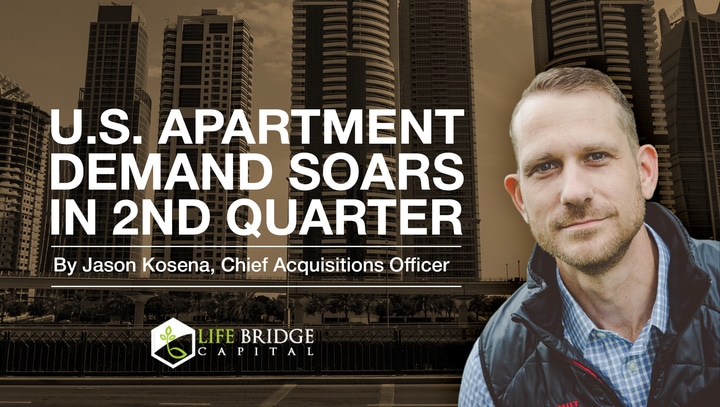The due diligence process for apartments reflects the increased responsibility that comes with housing many people. This guide to apartment complex due diligence will help you understand the many financial and physical reports to expect when investing in a multifamily asset.
Life Bridge Capital is a leading real estate syndication company. We offer our investment partners the opportunity to leverage shares of multifamily rental properties into a passive monthly income. Learn More
What is Due Diligence?
Due diligence refers to the information-gathering and disclosure process that occurs during real estate transactions. For example, when purchasing a single-family residence, buyers obtain a quick inspection and appraisal.
Before finalizing the transaction, multifamily investors will need to perform a deeper level of due diligence than the average single-family buyer. After all, the greater capacity of a building, the greater the risk.
Keep in mind that in a real estate syndication, the project sponsor handles all due diligence on behalf of the individual investors. The limited partners (investors) don’t have to handle any of it. Still, it’s useful to understand the process.
Read on for some key areas to include in your due diligence:
Financial Reports
Buying an apartment complex is essentially buying a business. As such, the prospective buyer needs to obtain a full picture of the financial health of the asset. Here are some ways to help you do just that:
Financial Audit Report
During the apartment complex due diligence process, a commercial real estate consulting company will conduct an inspection and generate a report with the results. In addition to inspecting the physical condition, the consulting company will inspect the building’s finances.
The financial audit gives the buyer an independent and detailed report of the complex’s finances. The figures in the report are essential for creating the most accurate analysis of the building’s potential profitability and for qualifying for financing.
To create the financial audit report, the consulting company analyzes the building’s operating history. From that, they can break down the specifics of the operating income and expenses.
Market Condition Report
Much of the success of a multifamily project depends on the property management company. Once the building is purchased, the management company engages subcontractors and serves as the customer-facing representative for the complex. The management company also performs a comprehensive market analysis for the purchase. With so much on the line, selecting a good (or bad) company will have immediate and long-lasting consequences for the project.
The market condition report compiles and compares information about the specific sub-market of the subject property. Many variables factor in, including the rents, occupancy, unit size, amenities, and more. Compare the results of the report to the previously made underwriting assumptions to create the most accurate projections.
Lease Audit Report
The property management company also creates the lease audit report. This report gives buyers a detailed run-down of the billing system, lease terms, income, and expenses. The data and the report offer early insight into ways the property and its management can be improved to increase rental income.
Appraisal
Last but not least on the list of financial due diligence items is the appraisal. The appraisal is created by a third-party professional selected by the lender, providing an assessment of the value of the subject property. The appraisal considers the net operating income and the market capitalization rate for income-producing properties to determine a value.
Physical Due Diligence
Multifamily investing success relies on the soundness and desirability of the property just as much as the financials. As such, several apartment due diligence items focus on the physical condition of the property:
Internal Property Condition Assessment
A licensed contractor of the buyer’s choosing creates a report on the property’s overall condition. This report, called the internal property condition assessment (PCA), details portions of the asset that need attention and general deferred maintenance. In addition, the PCA usually includes an opinion of the costs necessary to address these concerns.
Use the PCA to eliminate properties exceeding your renovation budget and to plan for future costs should the transaction move forward.
Property Condition Assessment
Next, a second property condition assessment provides a second opinion regarding the property’s condition. The difference is that this report is created by a professional selected by the lender. While this may seem redundant, the lender wants to protect its investment while the investor may be willing to take more risk to grow their money.
Unit Walk
Anyone who has ever lived in or managed a rental property can attest to a variation of conditions between units. Staggered renovations, challenging tenants, deferred maintenance, and even normal wear-and-tear create disparity among units within the same building or complex. During the unit walk portion of due diligence, the buyer or property management company can visit each unit within the complex, record the condition, and note key areas of improvement.
Site Survey
Third-party professionals create a map of the property. This will include lot size and a written description of the property. Use this to confirm that the legal bounds of the property match up to its current use.
Environmental Site Survey
Federal environmental laws apportion site cleanup responsibility to the current owner, so prospective owners conduct an environmental site survey to identify possible contamination on the property. The lender usually selects a third-party professional to conduct a report to identify contaminants on both the land and the structures. If any are found, then more comprehensive studies will be needed.
Green Report
Finally, the green report serves as an energy audit. Energy efficiency experts evaluate the asset and provide a report with the findings and opportunities to improve energy and water conservation, and thereby cost savings.
Final Thoughts
The heightened due diligence needed when buying an apartment complex can be time-consuming and expensive, but invaluable. This series of reports allow buyers to evaluate the purchase and avoid unexpected liability.
Life Bridge Capital is a leading real estate syndication company. We offer our investment partners the opportunity to leverage shares of multifamily rental properties into a passive monthly income. Learn More



